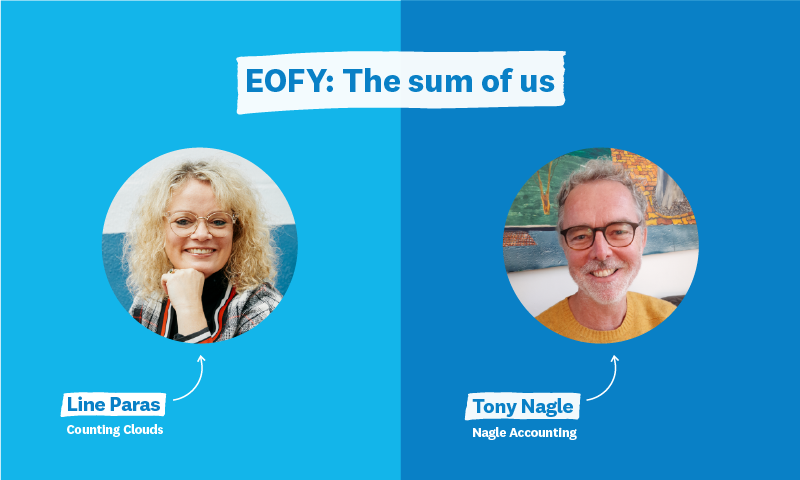
During this challenging period, many small business owners and their advisors have been busier than ever. But while the impact of COVID-19 continues to be felt, the requirements of year-end remain. And, now more than ever, it pays to be prepared.
As part of our series, ‘The sum of us’, the Xero team is exploring the relationships that pave the way for mastering tax time. Today, we’re speaking to Melbourne-based BAS agent Line Paras of Counting Clouds and accountant Tony Nagle of Nagle Accounting to uncover not only how they take on year-end together, but why they couldn’t do it without each other.
How did your collaboration begin?
Tony: Line and I got to know each other about four years ago because we had mutual clients. It turned out we both specialise in creatives – artists, musicians, craftsmen. It might be a sole trader who just bobbles along for a while and then suddenly lands a lead part in a multimillion dollar film. Or it could be a musician who’s just had a hit single and does well.
Line: Of course, if you’re playing in a band, you probably haven’t made any money for the last three months during COVID – and likely won’t for the next six. It’s during recent months that we’ve delivered some of our most valuable and collaborative service.
Tony: Most of our creative clients have survived COVID because Line and I have done a lot of work to ensure they’re organised. We ask ourselves, “What’s going to help them the most during this difficult time, and how can we deliver that in our respective roles?”
For example, do we turn off wages and ensure there are enough franking credits so we can push dividends to the band? Or do we want to access the PAYG stimulus?
Perhaps the artist has been successful in winning a grant. Grants are normally paid before 30 June, but you can argue that it’s income in advance for the next period.
Line and I have practically become a call centre for the tax office during COVID. But I’ve decided I’m not going to bill clients for those conversations. It’s part of my firm’s love and care approach in which we aim to have people stay with us for 20 or 30 years.
What makes your particular partnership work?
Line: We’re simpatico on caring for our mutual clients over the long haul, and we trust each other.
Maintaining and strengthening that trust sometimes requires conversations between us that happen out of earshot of the client. It’s possible an accountant and BAS agent can disagree on the best approach for a client. However, we always try to discuss it privately rather than critiquing the others’ approach in front of the client.
Tony: For some tax accountants, it might be tempting to just throw a bookkeeper under the bus. But if you don’t work collaboratively, you’re short-changing yourself. I’ve said this many times: a good bookkeeper makes an accountant look good.
When a bookkeeper is doing the BAS and all the preparation of the accounts is perfect, so my accountants just come in with the client to talk and plan, and we get the best outcome – for me, that’s tax nirvana.
It’s also about how you react to mistakes and your level of transparency. I learned a valuable lesson years ago from a client who was a line producer on the TV show Blue Heelers. I mucked up the payments to her cast, and I was terrified to tell her. She told me, “It’s only a mistake if you can’t fix it.”
And I find things are very fixable in Xero and, generally, in accounting.
Tell us about the tools you use to collaborate while working in separate practices
Tony: With Line and I using the same cloud-based software, we don’t have to pass journals between each other. We can lock periods and just collaborate with the bookkeeping. There’s no question about whether one of us has gone back and changed journals when you close off the year. What I’m seeing on the screen is exactly what Line is seeing in her own office.
Line: One thing that I do struggle with is accountants who don’t normally work in Xero and so don’t provide an end-of-year journal. They don’t put anything into Xero at all. And the software is no longer your single source of truth.
For more on how to prepare for EOFY, see Xero’s dedicated resource hub. It includes sections dedicated to accountants and bookkeepers, and an area just for small businesses. You’ll find the latest resources including webinars, checklists and useful information.
Leave a Reply